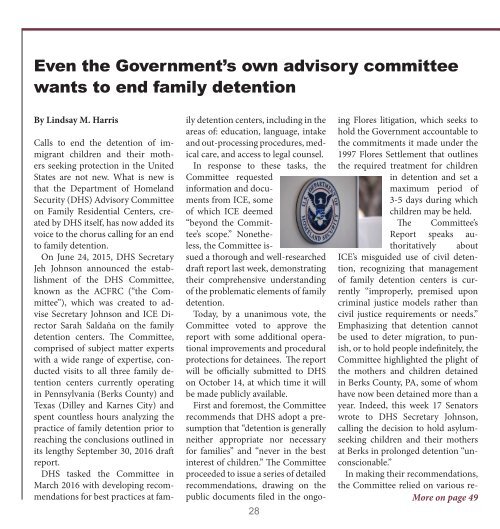GSN_Oct_YUMPU
Create successful ePaper yourself
Turn your PDF publications into a flip-book with our unique Google optimized e-Paper software.
Even the Government’s own advisory committee<br />
wants to end family detention<br />
By Lindsay M. Harris<br />
Calls to end the detention of immigrant<br />
children and their mothers<br />
seeking protection in the United<br />
States are not new. What is new is<br />
that the Department of Homeland<br />
Security (DHS) Advisory Committee<br />
on Family Residential Centers, created<br />
by DHS itself, has now added its<br />
voice to the chorus calling for an end<br />
to family detention.<br />
On June 24, 2015, DHS Secretary<br />
Jeh Johnson announced the establishment<br />
of the DHS Committee,<br />
known as the ACFRC (“the Committee”),<br />
which was created to advise<br />
Secretary Johnson and ICE Director<br />
Sarah Saldaña on the family<br />
detention centers. The Committee,<br />
comprised of subject matter experts<br />
with a wide range of expertise, conducted<br />
visits to all three family detention<br />
centers currently operating<br />
in Pennsylvania (Berks County) and<br />
Texas (Dilley and Karnes City) and<br />
spent countless hours analyzing the<br />
practice of family detention prior to<br />
reaching the conclusions outlined in<br />
its lengthy September 30, 2016 draft<br />
report.<br />
DHS tasked the Committee in<br />
March 2016 with developing recommendations<br />
for best practices at family<br />
detention centers, including in the<br />
areas of: education, language, intake<br />
and out-processing procedures, medical<br />
care, and access to legal counsel.<br />
In response to these tasks, the<br />
Committee requested<br />
information and documents<br />
from ICE, some<br />
of which ICE deemed<br />
“beyond the Committee’s<br />
scope.” Nonetheless,<br />
the Committee issued<br />
a thorough and well-researched<br />
draft report last week, demonstrating<br />
their comprehensive understanding<br />
of the problematic elements of family<br />
detention.<br />
Today, by a unanimous vote, the<br />
Committee voted to approve the<br />
report with some additional operational<br />
improvements and procedural<br />
protections for detainees. The report<br />
will be officially submitted to DHS<br />
on <strong>Oct</strong>ober 14, at which time it will<br />
be made publicly available.<br />
First and foremost, the Committee<br />
recommends that DHS adopt a presumption<br />
that “detention is generally<br />
neither appropriate nor necessary<br />
for families” and “never in the best<br />
interest of children.” The Committee<br />
proceeded to issue a series of detailed<br />
recommendations, drawing on the<br />
public documents filed in the ongo-<br />
28<br />
ing Flores litigation, which seeks to<br />
hold the Government accountable to<br />
the commitments it made under the<br />
1997 Flores Settlement that outlines<br />
the required treatment for children<br />
in detention and set a<br />
maximum period of<br />
3-5 days during which<br />
children may be held.<br />
The Committee’s<br />
Report speaks authoritatively<br />
about<br />
ICE’s misguided use of civil detention,<br />
recognizing that management<br />
of family detention centers is currently<br />
“improperly, premised upon<br />
criminal justice models rather than<br />
civil justice requirements or needs.”<br />
Emphasizing that detention cannot<br />
be used to deter migration, to punish,<br />
or to hold people indefinitely, the<br />
Committee highlighted the plight of<br />
the mothers and children detained<br />
in Berks County, PA, some of whom<br />
have now been detained more than a<br />
year. Indeed, this week 17 Senators<br />
wrote to DHS Secretary Johnson,<br />
calling the decision to hold asylumseeking<br />
children and their mothers<br />
at Berks in prolonged detention “unconscionable.”<br />
In making their recommendations,<br />
the Committee relied on various re-<br />
More on page 49















